News
Chinese film subdued by censorship
The Communist Party has introduced so much censorship and control of Chinese films that the industry is being ruined
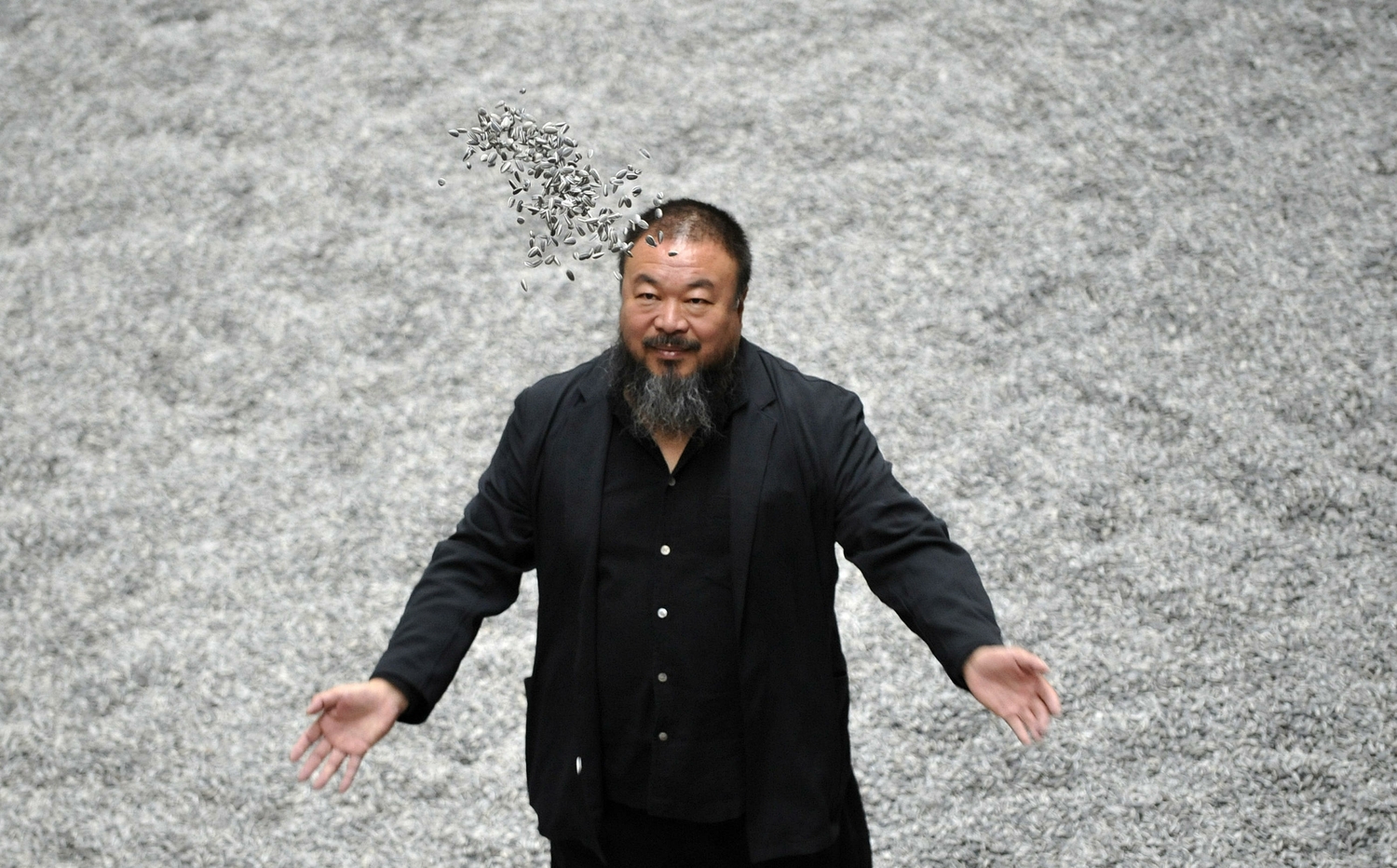
Censorship in China is now so extensive that the Chinese film industry is being ruined. Chinese documentaries are particularly at risk.
“It has become extremely difficult to make documentaries today,” says Ai Weiwei, one of China’s most famous artists, who produces several documentaries each year. His latest ‘Stay Home’, a story about HIV in China, has its world premiere at the Cph:Dox film festival that opens today in Copenhagen.
Read the whole interview Ai Weiwei: The news is all a lie and there is no debate
In China, censorship and control has increased over the past few years as the one party state has a new leadership.
“It’s going to get worse,” says Ai Weiwei. Although documentaries are primarily only shown in private homes and among small groups, the authorities are still trying to stop the genre. When directors try to shoot film or teach the trade, they risk being arrested by the police, Ai says.
“That limits people who are prevented from documenting part of history. And the state really makes a great effort,” Ai says.
Wang Jiuliang, a director who has produced several critical documentaries, agrees with Ai.
“The film environment has got worse because censorship is getting stronger,” Wang says.
Documentaries are not the only genre to fall foul of the authorities. Last week, the well-known director Feng Xiaogang lashed out at the Chinese censors in an interview with the Hollywood Reporter. Feng said the censors were holding back China’s film industry and that sometimes ‘A lot of the suggestions that they give you -- like, I almost want to laugh,” he says in the interview.
Ai Weiwei says such strong controls have corrupted the industry.
“There are no good Chinese directors – or at least they have lost heart. So they have begun to produce strange films – for example historical dramas about ancient China, or romantic films full of ridiculous jokes,” Ai says.
Ai Weiwei himself has been harassed and arrested by the authorities several times. In 2011 he disappeared for 81 days, an event the Danish director Andreas Johnson has documented in the film ‘The Fake Case’. Johnson’s film opened the Cph:Dox opening gala yesterday.
But asked whether China will ever see the Danish film, Ai Weiwei was certain.
“Never,” he says. He also knows that he may be arrested again – but that is not important to him.
“My own case is unimportant. I can disappear and never be heard from again. My revenge is to make a noise before I disappear. And that can happen at any time,” Ai Weiwei says.
(article quoted from Politiken, November 7, 2013, written by Beijing Correspondent Kim Rathcke Jensen)
Call for papers
Seismopolite Issue 6
The future of the biennial:
experimental places to reinvent political space?
The upcoming issue of Seismopolite Journal of Art and Politics will discuss the political future of the contemporary art biennial. How can biennials become experimental «sites» to rethink the relationship between art and politics, without lending themselves too easily to the confines of the contemporary art market and neoliberal political geography? While biennials are often criticized for subjecting themselves to urban/ regional marketing strategies, they are also defended as valuable places for the formation of new alliances among art scenes of the ‘periphery’, that are today steadily changing the global art map. How does this development affect the possibility of contemporary art to reflect and influence local politics?
Contributors from diverse disciplinary backgrounds are invited to submit essays, exhibition reviews or interviews that discuss the future of the biennial through a high variety of possible angles.
Topics may include (but are not restricted to):
- The capability of biennials to reflect and influence local politics.
- The art biennial as a global and regional phenomenon
- Biennials and political activism
- Art biennials as utopian political «sites»
- The potential of biennials to contribute to a rewriting of the history, political geography and epistemology of places and regions.
- Mobility, relational geography and regionalization in contemporary art
- The biennial as en experimental site for decolonization strategies and artistic interventions in geopolitical discourses
- Biennials as experimental regimes of bodily orientation and their politics of sensation
- Biennials as reimaginations of territorialities, and renegotiations of the concepts of space and place
We accept submissions continuously, but to make sure you are considered for the upcoming issue, please send your proposal, CV and samples of earlier work to
This e-mail address is being protected from spambots. You need JavaScript enabled to view it
within December 20, 2013. Commissioned works will be translated into Norwegian and published in a bilingual version.
Canada: Artist publishes book about ‘dirty oil and government censorship’
The ‘troublesome’ Canadian artist Franke James says that Canada’s Conservative government targeted, monitored and blacklisted her climate change artwork because it criticises the oil and gas industry’s environmental performance and clashes with the Canadian government’s push to develop Alberta’s tar sands.
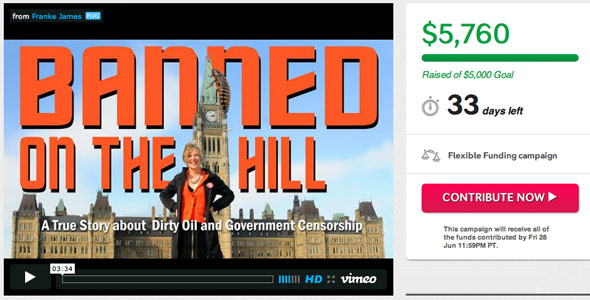
In 2011, the Canadian artist Franke James was supposed to have her work exhibited in 20 European cities. But the local NGO that was sponsoring her was allegedly bullied and intimidated so badly by Canadian officials that it pulled out and the entire show was canceled. A spokesperson for the government had explained that Ms. James’ show was about climate change and her opinions were contrary to those of the government.
However, Franke James does not intend to keep quiet about what she experienced — now she is publishing a graphic 368-page book, ‘Banned on the Hill: A True Story about Dirty Oil and Government Censorship’, about the ordeal which features passages from more than 2,100 pages of official memos, internal federal emails, and other records.
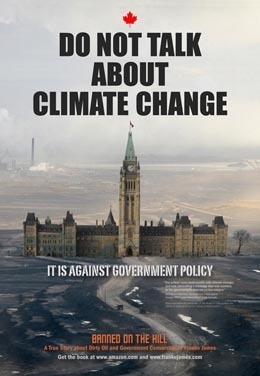
125 funders supported her crowdfunding-initiative on Indiegogo.com to advertise her cause in the Hill Times, an Ottawa political weekly, and to launch an outdoor campaign Monday in the capital. She managed to raise over 5,000 US dollars already a month before the fundraising deadline, and her ad began appearing in the Hill Times on 20 May 2013 with the headline: “Do not talk about climate change. It is against government policy.”
American climate activist and founder of the organisation 350.org, Bill McKibben, was quoted as saying: “The Canadian government has clamped down on scientists who tell the truth about the tarsands, and it’s tried to shut up artists too. Happily, Franke James is indefatigable.”
Franke James hopes her book will be a how-to guide for other activists.
Read more and see Franke James’ artwork:
The Guardian – 17 May 2013:
Artist finds inspiration in Canadian government’s attempt to silence her
Visual essays by Franke James reveal how the ‘troublesome artist’ was targeted because her views on climate change clashed with the push to develop Alberta’s tar sands. By Suzanne Goldenberg, US environment correspondent
The Toronto Star – 26 May 2013:
Climate activist’s book claims Conservatives tried to silence her
A new book by Toronto artist Franke James says her frequent criticism of Conservative climate change policy cost her federal funding for a European tour. By Raveena Aulakh
(article reproduced by permission from http://artsfreedom.org)
Azerbaijan: Harlem Shake video-maker arrested in Baku, protests in London
One month since Ilkin Rustemzade was arrested for filming a Harlem Shake video in Baku, human rights groups marked the day by staging an ‘Azerbaijan Harlem Shake’ protest in London while calling for the release of political prisoners in Azerbaijan.
This video was published on YouTube.com on 16 June 2013. Three days earlier, the Azerbaijani human rights group Art for Democracy published a press release from London. Here is an excerpt:
“Today, a group of Londoners staged a Harlem Shake protest in front of the Azerbaijani Embassy to call for the release of political prisoners in Azerbaijan. The protest was organised by the Art for Democracy campaign, ARTICLE 19, and Index on Censorship.
It follows the politically motivated arrest of Azerbaijani youth activist Ilkin Rustemzade in connection with a Harlem Shake video filmed in Baku. He faces up to five years in prison if convicted. Ilkin Rustemzade joins more than 80 other political prisoners in Azerbaijan.
The protesters made a Harlem Shake video to highlight the absurdity of Rustemzade’s arrest. The video is intended to draw international attention to the serious problem of political prisoners and the overall alarming human rights situation in Azerbaijan.
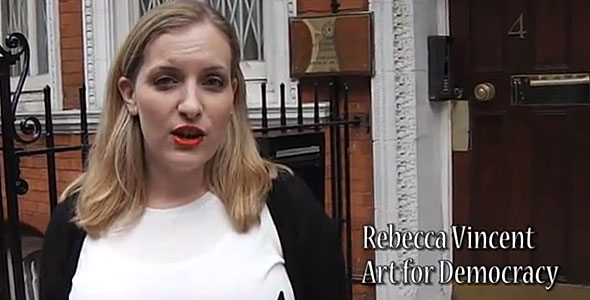
“The human rights situation in Azerbaijan is deteriorating every day, and we fear it will continue to worsen in the run-up to October’s presidential election. The international community – including the British Government – must end its policy of wilful blindness towards human rights violations in Azerbaijan and stop prioritising other interests ahead of the country’s democratisation”, said Art for Democracy’s Advocacy Director, Rebecca Vincent.”
Slate – 20 May 2013:
Harlem Shake Video Lands Azerbaijani Activist in Jail for “Hooliganism”
By Rebecca Vincent
• Arts for Democracy is a Baku-based campaign that seeks to use all forms of artistic expression to promote human rights and democratic reform in Azerbaijan.
• For more information, or to arrange interviews with spokespersons from Art for Democracy, please contact Rebecca Vincent at +44 (0)7583 137751 or This e-mail address is being protected from spambots. You need JavaScript enabled to view it
► Art for Democracy’s YouTube channel
► Art for Democracy’s Facebook page: facebook.com/Art4Democracy
(article reproduced by permission from http://artsfreedom.org)
China: Two Tibetan singers sentenced to two years in prison
Two Tibetan singers, Pema Trinley, 22, and Chakdor, 32, who were detained in 2012 for releasing a music album titled ‘Agony of Unhealed Wounds’ are reported by the Tibetan Centre for Human Rights and Democracy to have been secretly sentenced to two years in prison.
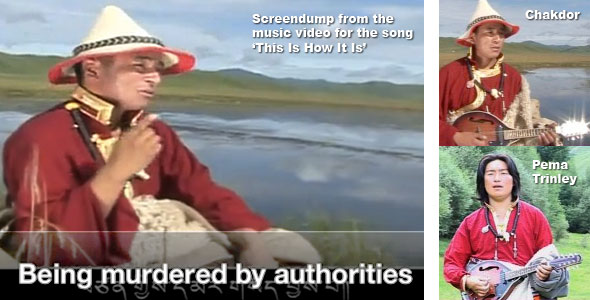
The two singers come from a nomadic village called Meuruma. They had recorded and distributed a music DVD containing songs about the current situation in Tibet, including self-immolation protests, as well as songs in praise of the Dalai Lama, Panchen Lama, Kirti Rinpoche (exiled head of the Kirti monastery) and Lobsang Sangay (exiled Tibetan political leader).
In July 2012, only few days after the release of the music album, both singers were arrested in the neighbouring Machu (in Chinese: Maqu) County in Kanlho (Chinese: Gannan) Tibetan Autonomous Prefecture, Gansu Province.
For over six months, they were detained in Ngaba County, sources told the human rights centre, before their secret sentencing in February 2013. Their whereabouts remain unknown. Two other Tibetans, musician Khenrap and lyricist Nyagdompo, who collaborated with the sentenced singers on the music album, have also gone missing.
Chakdor is a close cousin of Choepa who died in a self-immolation protest on 10 August 2012.
Continue reading here:
Tibetan Centre for Human Rights and Democracy – 13 June 2013:
Two Tibetan singers secretly sentenced but whereabouts unknown
A translation of Chakdor’s song, ‘This is How It is’ is available on highpeakspureearth.com.
Here is an excerpt:
Our rich natural resources,
Are being destroyed and exploited by coercion,
Our land is being robbed of its resources,
Against our wishes.
The legacies left by wise ancestors,
In the form of ten traditional wisdoms,
Are being systematically annihilated,
Against our wishes.
The snow covered mountain ranges,
The brave young patriots of Tibet,
Have been mercilessly murdered and slaughtered,
Against our wishes.
His Holiness the Dalai Lama Tenzin Gyatso
The living Buddha of our snowland,
Has been forced to go into exile,
Such is our tragic fate.
The following is an excerpt form Pema Thinley’s song, ‘Tragic Voices’ (in Tibeban: ‘Me-Ngag’)
Our spiritual teacher has been exiled to a foreign place,
The Tibetan people are turned into orphans,
The suffering under Chinese oppression is brutal,
Yet I couldn’t express the brutality.
The martyrs of our snow land Tibet,
Have offered their bodies as burning fuel,
The flames of their pain is great,
Yet I can’t hear the shrills of this excruciating pain.
(article reproduced by permission from http://artsfreedom.org)
More Articles...
- Istanbul: Turkish artists supportive of Gezi Park protests are targets of provocations
- Berlin: Agoraphobia. Prologue to the 13th Istanbul Biennial
- Sharjah: Sharjah Biennial 11: ‘Re:emerge, Towards a New Cultural Cartography’
- Oslo: solo exhibition by the Senegalese artist Issa Samb at the Office of Contemporary Art (OCA) 4 May - 23 June
Page 9 of 22










